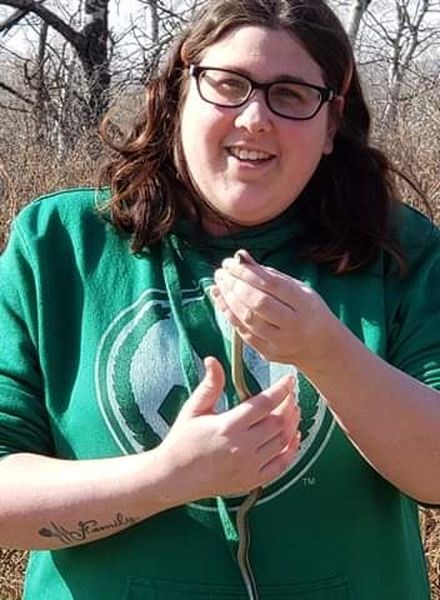A sight that may not be everyone’s idea of a fun way to spend an afternoon, greeted some Kamsack residents recently.
Amanda Leis and her parents, Carol and Marty Leis, made a spur of the moment decision to visit the local “snake pits” found near Pelly.
Each spring, thousands of snakes emerge from hibernation in this east-central Saskatchewan location, at the Fort Livingstone historic site near Pelly.
A yearly ritual, the continually growing population of red-sided garter snakes wake up from a frigid prairie deep-freeze, emerge from their dens, warm themselves, and begin mingling and mating.
The event usually kicks into high gear around the May long weekend, but according to Amanda, “there were literally thousands of snakes out everywhere” on May 12, the day the family ventured out for an adventure.
“My niece, Lexi Leis of Regina, usually comes to Kamsack for a visit,” Amanda said. “Last year for a change of pace we took her with us on an outing to visit the snakes. She was eight years old then, but she had such an amazing time watching the snakes slither around.
“This year, because of COVID-19, she’s not able to come down for a visit, so I and my parents made the trip out there to have a look, and take pictures and a video to send to her. She’s so disappointed to not be able to see this phenomenon for herself, in person, but we did the next best thing.”
The trio arrived at the snake dens at Fort Livingston around 4 in the afternoon and were greeted with the sight of thousands of slithering, writhing snakes.
“It’s really cool to see,” said Amanda. “It’s just interesting. There’s no danger, because they’re garter snakes, but what’s amazing is that they are everywhere. They hang from trees, covering rocks and in such clusters they are totally oblivious to people, they just crawl over your feet.
“We were the only visitors to the site at the time, so we were able to get some good photos and video for Lexi,” she said. “I would recommend this for anyone who has a chance to come and check it out.
“The scenery is really beautiful, and it’s quite an amazing opportunity to hear, see and touch so many snakes. I wasn’t really a fan of snakes until last year when we made our first trip to this place. Everyone should take it in at least once. It’s hard to describe the visual effect. It’s really unique and different.”
Although the correct term is “hibernaculum,” the snake dens are referred to colloquially as the “Pelly snake pits.”
The snakes have to get below the frost line in the winter, or else they will die. In the areas around Fort Livingstone, one will find limestone bedrock which has eroded over time and created caverns which the snakes pile into for the winter, hibernate and emerge refreshed in the spring.
Information found on the Internet says that the first such “mating maelstrom” was documented 145 years ago.
Starting around Mother’s Day each spring, and continuing for around two-and-a-half weeks, this annual show just might be worth the trip.




